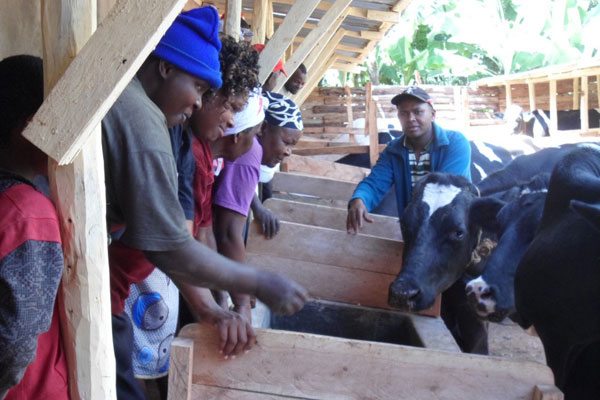When you visit his farm in Embu County, ensure that you switch off your mobile phone, and you should not laugh loudly because you may disturb the cows.
These are some of the measures that Michael Gitonga, a dairy farmer, has taken to ensure that he gets optimum milk from the animals.
“The cows should not be stressed. Any noise can affect their mood and they may fail to produce the required amount of milk. Sometimes they even react negatively to certain colours,” he explains.
Gitonga has eight Freshian cows, which produce about 255 litres of milk a day. He ensures that this high production rate is maintained by keeping the animals stress-free.
The founder of Blessing Farm located in Muthege village, Mukuuri sub-location has been in the dairy farming business for the last 10 years, raking in hefty earnings.
“I believe dairy farming is my vocation. I started farming when I was in Class Five. My father gave me a piece of land where I planted nappier grass and sold to my uncle on credit,” explains the 30-year-old.
At one time, his uncle paid him Sh900, which he used to purchase his first goat.
“That was in 2003. The goat multiplied. By the time I had completed Class Eight, I had nine goats. Then I sold six goats which gave me Sh7,000. I used the money to buy an Ayrshire calf at Sh6,500.”
Gitonga practises zero-grazing on his one-acre plot, which has proved that space is not an issue for anyone looking to get into such a venture.
He also grows trees. Until 2012, Gitonga says, his five cows used to produce only 40 litres of milk per day.
A visit to various farmers in the county and dairy farming forums educated him on different feeds to give his animals.
Gitonga started to give the animals soya beans and sunflower, besides nappier grass. This saw them increase production to 70 litres.
“I learned from fellow farmers how to mix nappier grass with molasses and soya beans, which make the cows produce more milk.”
Encouraged by the production, he increased his herd to eight cows. This saw his milk production rise from 70 litres to 100, then to 170 and currently between 240 and 255 litres a day.
Gitonga gives his animals different kinds of feeds, which he learned from farmers’ forums and the New Kenya Cooperative Creameries (KCC), the company he is attached to and which buys his milk at Sh40 a litre.
“I ferment bran feeds, maize germ plus protein supplements such as soya, sunflower, magic dairy and fish meal. These provide a balanced diet, which make the cow produce more milk.”
Gitonga, who is currently the new KCC privatisation committee national vice-chairman, adds: “The cows make enough money to feed themselves and pay the workers. They are not stressful. What one needs when making the feeds is the correct ratio of different ingredients. I give them food only once, at 7pm after the third time milking.”
Gitonga has visited various exhibitions, including one in Zimbabwe, where he learned dairy farming tips.
“I practise what I learn in different exhibitions and tours. I have been attending almost all dairy farming exhibitions within and outside the county. Last year, I attended the East and South Africa Dairy Association conference and exhibition in Zimbabwe, courtesy of KCC.
That is where I learned some of the things I am practising currently,” says Gitonga, who is a member of Mutugi Commercial Dairy Cow Management Self-Help Group.
Besides feeding the animals well, Gitonga says he keeps them in a clean environment and takes care of their health.
“You should be friendly to your animals. Though I have employed two people, I visit the cows regularly, thus I am able to tell what they need.” From his earnings, he has bought a tanker that has been hired by KCC Runyenjes cooling plant to collect milk from satellite coolers in Embu and Kirinyaga counties.
“I love dairy farming. This is one among other farming ventures where you can harvest two or three times a day. Then, you don’t have to seek a permit to keep cows, they produce manure, meat and a calf every year. I believe that milk is number three after gold and petroleum,” says Gitonga, who dropped out of school in class eight to pursue dairy farming.
His farm has become a model where he teaches his colleagues on how to improve productivity.
During such visits, the affable man strolls with farmers, explaining how he started, what is needed for a cow to produce enough milk and how to sell the commodity.
The farmers, who travel from as far as Meru, Tharaka-Nithi, Nyeri and Nairobi counties, pay Sh400 for the visits.
In three years, Gitonga hopes to be a local dairy cow breeder.
His main challenges include the poor road network that makes him lose milk, especially when it rains. The area has no electricity, making it hard for him to install and use a milking machine, which works better than human hands.
Michael Gitonga can be reached on: 0720 392 716.








